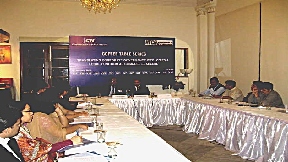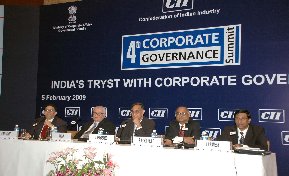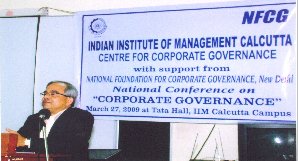The following initiatives were undertaken by NFCG towards promoting Corporate Governance (Oct –Dec 2008): - -
(A) EVENTS ORGANIZED BY / UNDER THE AEGIS OF NFCG
Series on Translating Governance Ideologies & legal Function as Business Enablers
 The first of the four series on ‘Translating Governance Ideologies and Legal Functions as Business Enablers' was organized by Confederation of Indian Industry (CII) in partnership with NFCG on January 16, 2009 at Kolkata. The programme brought together corporate and finance professionals and facilitated a two-way information flow – with corporate vision and principle flowing down from the management level and decoded systems and activities flowing upwards. The programme focused on translating corporate governance ideologies, values and concepts into pragmatic ground-level doable activities with a focus on the legal framework of the Company; and also provide simple yet efficacious tools to assimilate and implement a robust system that would enable the structuring of the legal function and to manage risks arising out of legal non-compliances.
The first of the four series on ‘Translating Governance Ideologies and Legal Functions as Business Enablers' was organized by Confederation of Indian Industry (CII) in partnership with NFCG on January 16, 2009 at Kolkata. The programme brought together corporate and finance professionals and facilitated a two-way information flow – with corporate vision and principle flowing down from the management level and decoded systems and activities flowing upwards. The programme focused on translating corporate governance ideologies, values and concepts into pragmatic ground-level doable activities with a focus on the legal framework of the Company; and also provide simple yet efficacious tools to assimilate and implement a robust system that would enable the structuring of the legal function and to manage risks arising out of legal non-compliances.
Series on Translating Governance Ideologies & legal Function as Business Enablers
Corporate Governance Summit: India's Tryst with Corporate Governance
The 4th Corporate Governance Summit: India's Tryst with Corporate Governance was organized by Confederation of Indian Industry (CII) in partnership with NFCG on February 5,2009 at Mumbai.
 The summit was organized in the view of the recent events in the domain that had brought a number of serious Corporate Governance issues in the spotlight and also sparked a debate on whether India possess adequate laws and guidelines for corporate governance. Thus the summit provided platform for deliberation and extensive interaction among the Govenment, regulators, Industry, professional and public at large on the recent Corporate Governance issues e.g. the role of the third party, Board (specially independent directors), promoters, management, Government and Regulators.
The summit was organized in the view of the recent events in the domain that had brought a number of serious Corporate Governance issues in the spotlight and also sparked a debate on whether India possess adequate laws and guidelines for corporate governance. Thus the summit provided platform for deliberation and extensive interaction among the Govenment, regulators, Industry, professional and public at large on the recent Corporate Governance issues e.g. the role of the third party, Board (specially independent directors), promoters, management, Government and Regulators.
4th Corporate Governance Summit: India's Tryst with Corporate Governance
National Conference on Corporate Governance
The second National Conference on Corporate Governance was organized by Loyola Institute of Business Administration, Chennai (LIBA) in partnership with NFCG on February 9,2009 at Chennai. The conference-addressed issues concerning the emergence of the concept, the manner in which it crystallized into a subject of importance, its various problems issues, its constituents and how it was beginning implemented in India.
Corporate Compliance Forum India
The Corporate Compliance forum India was organized by Lexis Nexis in partnership with NFCG on February 24-25, 2009 at Mumbai. The conference focused on the practising Company Secretaries both in India and globally; Monitoring System and implementation of dynamic risk strategies; Role of the Board of Directors; Case studies about Corporate Social Responsibility; Ethics and compliance culture; Detection and prevention of fraud; Recent changes in business regulations from the management level and decoded systems and activities flowing upwards. The programme focused on translating corporate governance ideologies, values and concepts into pragmatic ground-level doable activities with a focus on the legal framework of the Company; and also provide simple yet efficacious tools to assimilate and implement a robust system that would enable the structuring of the legal function and to manage risks arising out of legal non-compliances.
Directors Orientation Programme
The Institute of Company Secretaries of India (ICSI) in partnership with NFCG organized Directors Orientation Programme on Corporate Governance on March 25, 2009 at New Delhi. The Orientation programme was the third out of four programmes organised by ICSI-NFCG at various place across the country during this year with an aim to provide opportunity to Board members to deliberate upon intricate issues in the good Corporate Governance practice. The programme focused on the needs and importance of CG, Independent Director Vs Directors independence; Changing paradigm in CG and Corporate ethics; Evolution of concept of CG and present regulatory framework; Directors roles, responsibility, duties, powers and liabilities; Audit Committee performance and effectiveness, etc. .
National Conference on Corporate Governance
IIM Calcutta in partnership with NFCG organized National Seminar on Corporate Governance: Corporate Governance at Cross Roads on March 27 2009 at Kolkata.
 In the view of recent financial crisis and widespread feeling that the corporate governance model adopted by most countries has failed to deliver the desired results, this Conference aimed at reviewing the present Corporate Governance models and generate ideas on how to make the model more robust. The Conference focused on topics like Corporate governance in the financial sector; Role and effectiveness of independent directors in the present corporate governance model; Role of the auditor and the audit committee in corporate governance; and Corporate Social Responsibility.
In the view of recent financial crisis and widespread feeling that the corporate governance model adopted by most countries has failed to deliver the desired results, this Conference aimed at reviewing the present Corporate Governance models and generate ideas on how to make the model more robust. The Conference focused on topics like Corporate governance in the financial sector; Role and effectiveness of independent directors in the present corporate governance model; Role of the auditor and the audit committee in corporate governance; and Corporate Social Responsibility.
National Conference on Corporate Governance
National Seminar on Corporate Governance
The Institute of Chartered Accountants of India (ICAI) in partnership with NFCG organized National Seminar on Corporate Governance at March 28, 2009 at Hyderabad. The seminar was the last of four seminars organised by ICAI-NFCG at various places across the country during this year with an aim to create awareness in good governance practices. This seminar focused on the Roles of Regulators and harmonizing the regulatory requirements with that of Companies Act for effective Corporate Governance; Role of the Board and Audit Committee in ensuring best corporate governance; Corporate Governance in Family owned Enterprise and SMEs; Corporate Governance practices in banking, Insurance Companies and Public sector undertaking and role of CA's in ensuring better CG.
RESEARCH PROJECTS UNDER THE AEGIS OF NFCG
Ongoing Research Projects
Research on Family Run Business along with case studies-
Indian Institute of Management Calcutta (IIMC)
Research on Corporate Social Responsibility-
Symbioses Institute of Management (SIMS) Pune.
Research study on Improving Internal Controls for better Corporate Governance–
Symbiosis Institute of Management Studies, (SIMS) Pune.
Research study on Corporate Board Interlock in India and their implications for Good Corporate Governance-
Indian Institute of Management Bangalore (IIMB).
Research project on Group Companies in India-
National Law School of India University (NLSIU) Bangalore.
Case Study on areas relevant to the Corporate Governance –
National Law School of India University (NLSIU) Bangalore.
Research work on Corporate Governance -
Jamanalal Bajaj Institute of Management Studies (JBIMS), Mumbai.
Research study on Corporate Governance Practice in SMEs –
Administrative Staff College of India (ASCI) Hyderabad.
Developing Corporate Governance Norms for SMEs –
Indian Institute of Technologies Kharagpur (IITK).
Research study on Corporate Practice in SLPE in Andhra Pradesh –
Administrative Staff College of India, (ASCI) Hyderabad.
Case Study on Corporate Governance –
Management Development Institute (MDI), Gurgaon.